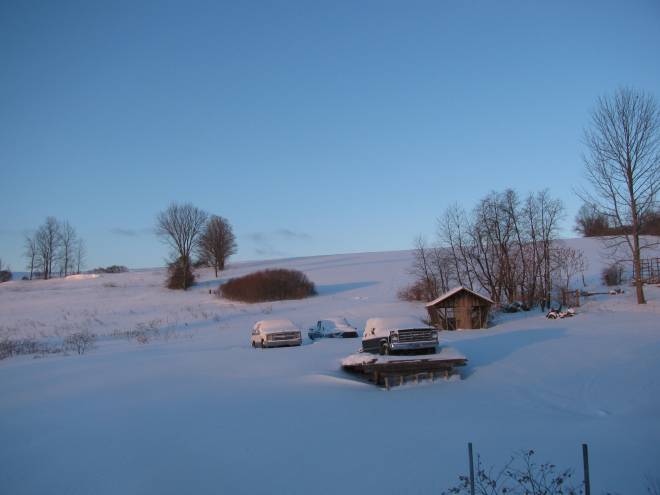
No one wants to see these photos. No one wants to look backwards even a few days right now.
It’s March, and fifty-degree temperatures are rounding the snow, revealing brown grass, and yellowing the willows. The sun seems encouraged by our willingness to shift our clocks towards daylight, so it erases the snow, humiliates it into brown grey shadows and sloppy weeping heaps.
Like everyone, I lift my scarfless face outside and smile. My hatless hair warms. We are finally able to really play in the snow, now that it sticks to itself and the wind doesn’t cut at our cheeks and eyeballs. We build a snow fort guarded by a snowperson, who gazes wistfully across the field while shrinking. We squelch back to the house, soaking wet.
It will snow again, no doubt, but the deep of winter has passed, and I won’t forget it. Winter burned itself into my brain. It carved new muscles into my arms and new images into my retinas.
As winter recedes, spring is ugly and messy for the moment, like something just born. I think about how winter is both an afterlife and a beforelife. The flames of fall gutter into ashes, and the phoenix of spring will rise. In the sharp white days between, we wait.
Although our houses and cars and fossil fuels and well-traveled food insulate us from winter’s leanest realities, it is still real. Our first winter in years outside the Deep South has reminded us how raw and long it can feel. The dramatic northeastern seasons will sculpt us, honing our edges like wind on the drifts, turning us on the lathe of the year into eloquent curving shapes.
Today I buy boots. Mud-loving boots that open the door and carry me into this wet season. Our eight rubber boots that stairstep by twos in the mudroom will traipse the soft earth, ready to leave new marks on our farm, ready for its imprints on us.






 Full of Georgia sweet potatoes that we baked in crisp, soft-centered medallions for lunch, we have enough energy to head outside. That is, we have enough energy to spend 20 minutes herding our kids into the layers of clothing, snowpants, hats, mittens, scarves, coats, and boots required in zero degree, still-snowing weather. Sam wears my grandpa Andrew Lehman’s scarf, which I wore in college, crocheting a bright orange patch to keep it alive. Stella wears the hat my husband Andrew wore when we first started dating in college; she likes its dangly pom-pom.
Full of Georgia sweet potatoes that we baked in crisp, soft-centered medallions for lunch, we have enough energy to head outside. That is, we have enough energy to spend 20 minutes herding our kids into the layers of clothing, snowpants, hats, mittens, scarves, coats, and boots required in zero degree, still-snowing weather. Sam wears my grandpa Andrew Lehman’s scarf, which I wore in college, crocheting a bright orange patch to keep it alive. Stella wears the hat my husband Andrew wore when we first started dating in college; she likes its dangly pom-pom.
 Well-packaged, we clomp out through our disheveled mudroom and into the snow. It fell most of the night and all morning. It keeps coming, now in small fast bits that tingle our cheeks, and now in bigger dreamy flakes that circle and move sideways. The driveway needs shoveling for the fourth time, but it’ll wait.
Well-packaged, we clomp out through our disheveled mudroom and into the snow. It fell most of the night and all morning. It keeps coming, now in small fast bits that tingle our cheeks, and now in bigger dreamy flakes that circle and move sideways. The driveway needs shoveling for the fourth time, but it’ll wait.

 Moving with resistance feels satisfying. I have always loved being immersed in water. Even frozen into billions of unique, feathery crystals, this water holds us. It cushions, forgiving us when we flail and fall. We can swim. I feel buoyant.
Moving with resistance feels satisfying. I have always loved being immersed in water. Even frozen into billions of unique, feathery crystals, this water holds us. It cushions, forgiving us when we flail and fall. We can swim. I feel buoyant. I feel out of breath. We flop down at the base of the drift. Soon, Andrew tosses Sam on top of it, and they make a sliding board, which delights even our skeptical Stella, who forgets her frozen nose while sliding. Then, Andrew digs like a badger, emerging with his beard frosted from inside a cave that Sam can nearly sit up in.
I feel out of breath. We flop down at the base of the drift. Soon, Andrew tosses Sam on top of it, and they make a sliding board, which delights even our skeptical Stella, who forgets her frozen nose while sliding. Then, Andrew digs like a badger, emerging with his beard frosted from inside a cave that Sam can nearly sit up in.




 A cold cold night feels like a thunderstorm, beautiful and menacing. As we sleep, pipes freeze in the kitchen, despite a thermostat set at sixty degrees. Snow blows across the fields like steam. On our mudroom floor, mice killed in traps freeze solid so they must be pried free in the morning.
A cold cold night feels like a thunderstorm, beautiful and menacing. As we sleep, pipes freeze in the kitchen, despite a thermostat set at sixty degrees. Snow blows across the fields like steam. On our mudroom floor, mice killed in traps freeze solid so they must be pried free in the morning.